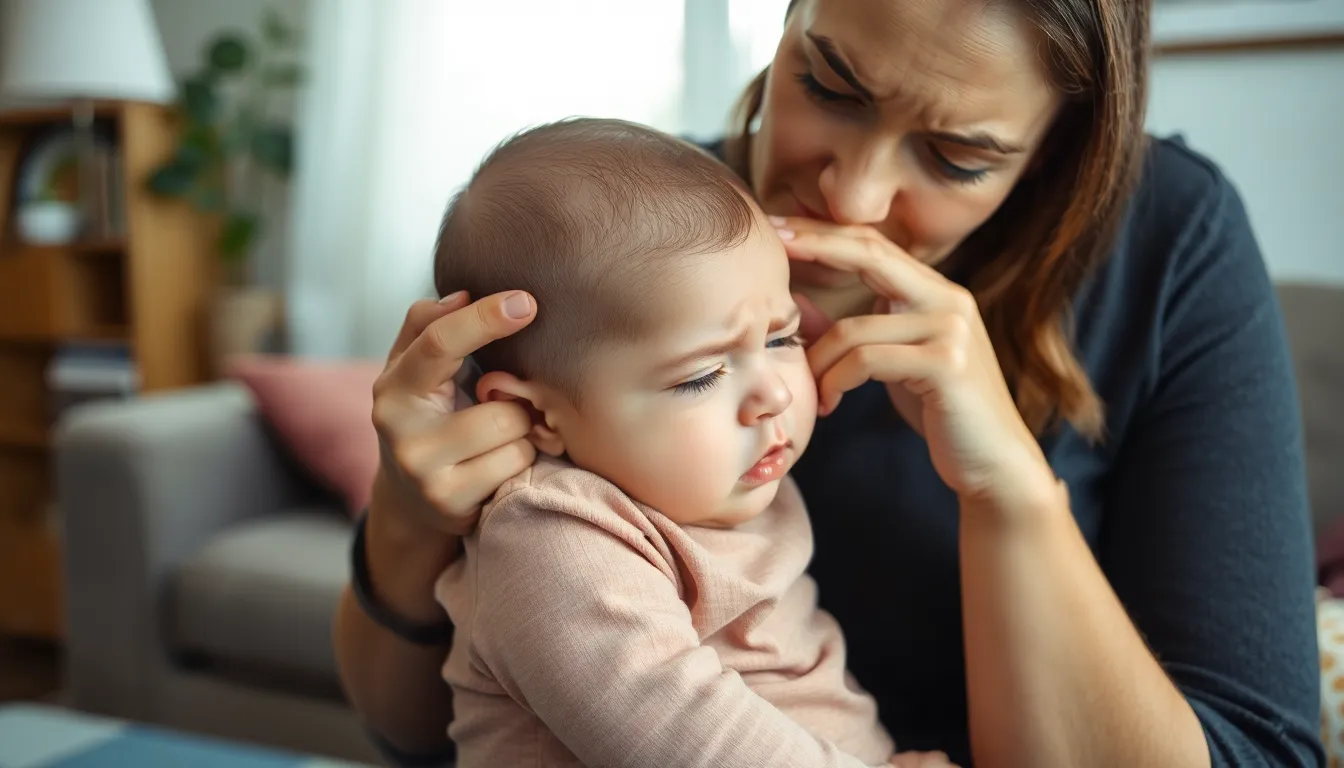Table of Contents
ToggleWhen parents hear the word “ear infection,” panic often sets in. But what if there’s no fever? That’s right—your little one can still experience ear trouble without the telltale rise in temperature. Understanding the signs can be a game changer, helping parents act swiftly and keep their sanity intact.
Understanding Ear Infections in Babies
Understanding ear infections in babies involves recognizing symptoms beyond fever. Many parents believe fever indicates an ear infection; however, several signs can appear without it. Increased irritability often accompanies discomfort in the ear, leading to fussiness in babies. Loss of appetite may arise as chewing and swallowing become painful.
Ear pulling or rubbing frequently suggests irritation. Babies often tug at their ears or turn their heads to alleviate pressure. Sleep disturbances can occur, with many infants showing restlessness during naps or nighttime. Fluid drainage from the ear, whether clear or colored, signals an infection that may or may not coincide with fever.
Difficulty hearing can affect a baby’s response to sounds. Parents should monitor their child’s reactions to noise levels, noting any changes in behavior. A general lack of energy or lethargy may also develop when an ear infection is present. Symptoms can often mimic those of a cold, making prompt recognition crucial.
Consulting a healthcare provider remains essential for accurate diagnosis and treatment. They can assess the baby’s symptoms and may suggest observation or antibiotics depending on the severity of the infection. Early identification of these signs ensures proper care, significantly improving the baby’s comfort and health.
Common Symptoms of Ear Infections Without Fever


Ear infections in babies can present various symptoms that don’t include fever. Recognizing these signs can help parents seek timely medical advice.
Behavioral Changes
Increased irritability often indicates discomfort. Babies might exhibit heightened fussiness, particularly when lying down. Loss of interest in favorite toys or activities can also signal ear infection distress. Frequent crying or difficulty being soothed may arise during playtime or bedtime. Additionally, reduced engagement during feeding times reflects changes in behavior that could suggest an ear issue.
Physical Signs
Notable signs may include ear pulling or rubbing, which often occurs when pressure builds up in the ear canal. Parents might also observe lethargy, where a baby seems unusually tired and less responsive. Fluid drainage from the ear, whether clear or cloudy, can indicate an infection. Difficulty hearing or responding to sounds might manifest, as a baby may not react to familiar noises. Such physical symptoms warrant prompt consultation with a healthcare provider for accurate diagnosis and appropriate treatment.
When to Seek Medical Attention
Recognizing when to seek medical attention for a baby with potential ear infection symptoms is vital. Increased irritability or fussiness often serves as a red flag. Parents should consider contacting a healthcare provider if their baby displays significant changes in behavior, such as lethargy or reduced interaction during feeding.
Fluid drainage from the ear might indicate a more serious issue. Ear pulling or tugging can signal discomfort and should prompt a discussion with a pediatrician. If the baby shows difficulty hearing, it’s essential to seek evaluation.
While fever typically suggests infection in children, its absence does not rule out an ear infection. Parents must not overlook symptoms like rapid changes in sleep patterns or decreased appetite, as these can also point toward an ear problem.
Close monitoring of these symptoms helps parents decide when to consult a medical professional. Timely intervention can lead to effective treatment, improving comfort and overall health. When in doubt, reaching out for medical advice ensures that the baby’s well-being remains a priority.
Home Remedies and Care Tips
Using home remedies for ear infections can help alleviate discomfort. Applying a warm compress to the affected ear may provide relief. Parents can also encourage their baby to stay hydrated, as fluid intake helps thin mucus. Elevating the baby’s head during sleep can ease pressure in the ear.
Natural remedies like olive oil can soothe irritation. A few drops may help lubricate the ear canal. However, it’s essential to ensure no fluid drainage is present before trying this method. Keeping the environment smoke-free is important, as smoke can irritate the respiratory system.
Gentle massage around the ear area might also help soothe discomfort. This technique can promote relaxation and distract from pain. Additionally, using a humidifier in the baby’s room can maintain moisture in the air, which aids in comfort.
Avoiding exposure to allergens can reduce irritation. Dust and pollen can worsen symptoms, so keeping the baby’s area clean may help. Regular handwashing prevents the spread of germs, lowering the risk of infection.
Monitoring symptoms closely remains crucial. If irritation persists or worsens, consulting a healthcare provider is advisable. Parents can also track any changes in behavior or feeding patterns to discuss with the doctor. Early intervention ensures better outcomes and helps maintain the baby’s overall health.
Understanding that ear infections in babies can occur without a fever is essential for parents. Recognizing the various symptoms like irritability, ear pulling, and changes in feeding habits allows for timely intervention. Parents should remain vigilant and seek medical advice when they notice these signs to ensure their baby’s health and comfort.
Utilizing home remedies can provide temporary relief while monitoring symptoms closely. It’s crucial to maintain open communication with healthcare providers for accurate diagnosis and treatment. By staying informed and proactive, parents can effectively manage their baby’s ear health and enhance their overall well-being.




